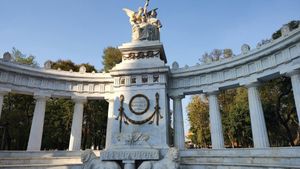Labour’s Education Secretary Bridget Phillipson faced severe backlash following her meeting with Katharine Birbalsingh, the headmistress of Michaela Community School and well-known advocate for traditional educational values. What was meant to be a constructive dialogue turned testy as Birbalsingh, often labeled as Britain’s strictest headteacher, emerged with scathing criticism about Phillipson's grasp of her own proposals and her views on academies.
The meeting aimed to align Labour's education strategies with insight from successful academy leaders, but it concluded with Birbalsingh's blunt letter denouncing Phillipson's perspectives and performance. Birbalsingh's missive, widely circulated among educators, outlined numerous shortcomings she perceived in Phillipson's approach, asserting, "You do not appear to know your own Bill... You were the Shadow Education Secretary for three years. It should not be left to school leaders to point out the holes.”
The harsh assessment pointed to Phillipson’s, perceived ignorance about the strengths of high-performing academies. Birbalsingh argued vehemently, "You claim to be a great believer in the high standards academies have brought. But we saw you twist your face with disgust every time you said the word ‘academy’ during our meeting." This suggests not only personal disdain but also indicates ideological differences about the fundamental role of academies within the public education system.
Among the major grievances listed by Birbalsingh were Phillipson’s failure to acknowledge successful academies, her inability to define curriculum issues or state which schools were failing to meet basic standards, and what she termed, "A Marxist ideological dislike of academies." The exchange has raised questions about how Labour's education policies will be shaped moving forward, especially as critiques of the government’s proposals intensify.
Birbalsingh’s Michaela Academy, located in north-west London, boasts remarkable educational outcomes, consistently outperforming many elite institutions even with its less affluent intake. The school's success, attributed to rigorous discipline and innovative teaching methods, starkly contrasts with the Labour party's current educational strategy. Critics have pointed out conflicting philosophies between those who advocate for autonomy within academies and those who support centralized control.
Notably, Phillipson’s recent attempts to reform education through new legislation have already ignited discontent among many educational leaders, including those within Labour's ranks. Reports have surfaced claiming inner party discussions depicted Phillipson as ineffective, leaving her credibility weakened, particularly as she continues to grapple with her party's heavy focus on unions over direct engagement with educators.
Birbalsingh expressed concerns about prospective admissions policies and teacher recruitment proposals, declaring, "You should stick to your convictions... admit you do not believe academy freedoms are good and want central government to control everything." This assertion unpacks the underlying tension between the ideological positions of currently favoring locally governed schools versus those advocating for more government oversight.
What makes this clash all the more fascinating is the political backdrop of the Labour party under Keir Starmer, which was initially seen as revitalizing the party's image. Observers within the educational sector have now begun to voice concerns about its representatives genuinely engaging with successful educational models.
Phillipson's tenure is now under scrutiny: is she aligning with the leftist inclinations of her party, disregarding insightful approaches heralded by successful academy leaders? With internal backlash brewing, the question remains whether the education secretary can navigate these turbulent waters without losing more allies among school leaders.
The row also highlights how Phillipson's approach dovetails with broader perceptions about Labour's educational agenda. Amidst accusations of trying to thin the academy model to fit local authority guidelines, Labour's commitment to championing innovation within the educational sphere is now being seriously questioned.
Government sources have attempted to downplay the incident, calling Birbalsingh's account "a total work of fiction" and accusing her of being overly aggressive during the meeting. This counter-narrative seeks to absolve Phillipson from the mounting pressure and negative publicity stemming from the real discussions surrounding the future of education.
Regular educators and school leaders have responded to both sides of this dispute with increasing anxiety. The notion of removing freedoms linked to successful educational practices because of political ideology has sparked outcry among many who fear it could stifle innovation where it is most needed.
What follows for Phillipson and Labour's education reform agenda is uncertain. The clash with Birbalsingh may only reveal the fissures beneath the surface of the party, as the education sector awaits clarity on policy direction amid rising discontent.
Birbalsingh's message was not lost on observers; she challenges the chief policymakers to engage directly with those achieving results rather than creating sweeping policy changes devoid of substantive input from educators experiencing day-to-day realities. The central tenet of her advocacy: true educational advancement stems from those at the forefront—teachers, leaders, and institutions thriving under their established frameworks.
If the battle of narratives persists, it spills out of conference rooms and directly impacts the schools themselves. Clarity and alignment within Labour on educational approaches may be imperative not just for party success but for the futures of the children and schools depending on effective leadership.



